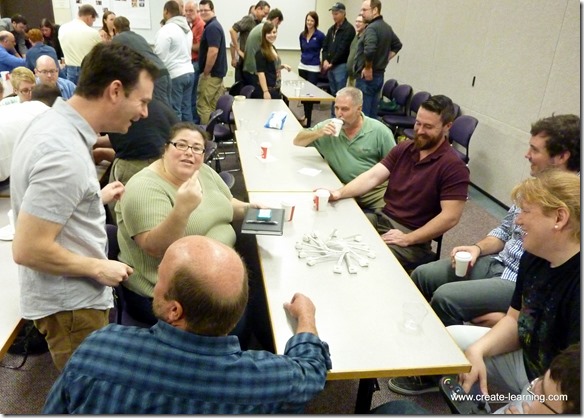“I always thought I was a fabulous team player, but always wondered why my team struggled so much. Since taking this program, I’ve learned there are so many things I could have been doing to help my team work better together. And since applying some of the concepts from this class, there has already been improvement. Thanks Mike!” – Missy Eloff, Training Coordinator at Baker Victory Services

When you are not the manager or team leader can you impact a teams performance?
Teams operate within multiple systems.
- The organization itself with its culture and way work gets done.
- The team itself with its culture and way work gets done.
- The individuals on the team with their perception of the team, the organization, the management and the work.
- The task to be completed.
- How all of the above interplay and overlap.
One person will affect team performance.
When that person has a ‘better-way’ and knows what to-do, I argue they are morally accountable for sharing and applying what they know (this is employee engagement).
An obvious claim is that teams achieve results when everyone on the team knows and understands the Goal / Purpose. We have been on teams where this was not as clear as the team leader / project manager thought.
On bad teams, trust-repelling teams, when you question the team leader they get frustrated, yell at you and think you were trying to usurp their power.
On good teams, trust-attracting teams, when you questions the team leader they listen and the ‘how the work gets done’ is up to you.
How can you make the team better when you’re not the team leader or manager?
- Ask questions, in an unassuming manner. I’m still a little unclear about the goal for the team. I may be alone, and can the team help me?
- Share your story. From what I can tell so far, and please correct my assumptions. The teams goal is x and we are here today because we need to best determine some steps and accountability for all of us to achieve x.
- Ask others how they see their skilled-knowledge being useful to the team. I think that on this team my skills in p,q, and r will prove beneficial. Does anyone else see where their talents and skills may assist the team in achieving x?
- Look for areas of cooperation. (insert name here) has done a great job of pulling together the right people and sharing the context and problems that have to be solved. I wonder (insert name here) in what ways can we as a team, ensure that you are successful with this project?
- Gather information and do your work. From the team meeting, be the person who is trustworthy and gets their work done.
- Avoid gossip, trash talking, and any shit stirring. If you hear it, STOP IT!
All you can do is your best and seek to create an environment where you can do your best. When you feel yourself getting frustrated or not able to offer your best work, you have to decide how to make progress.
Focus on using your skills and knowledge for good and continuously look for cooperation moving the team forward.

